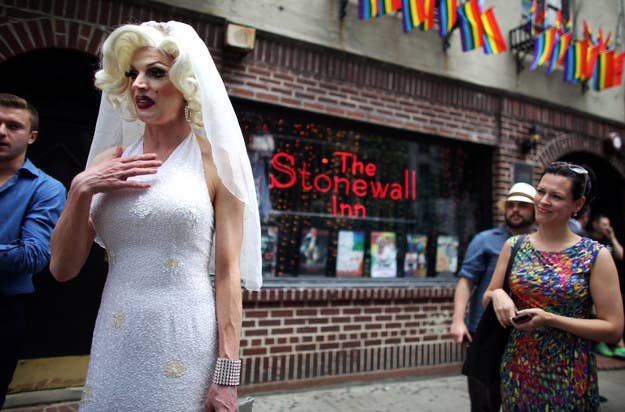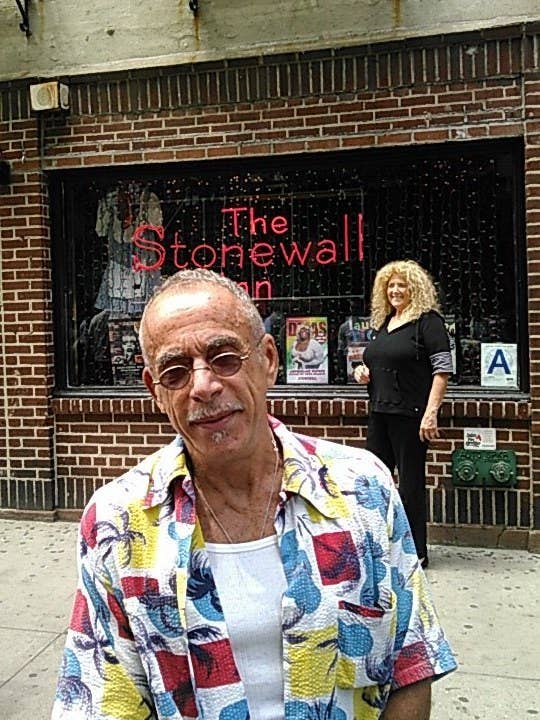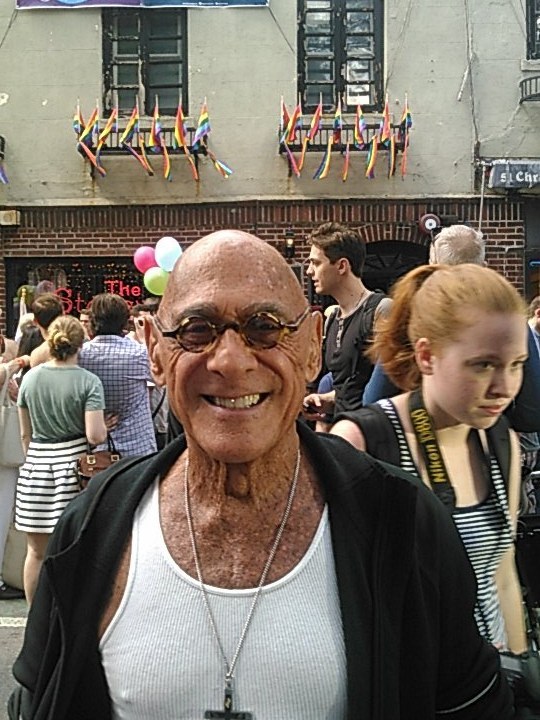
On Friday, just hours after the Supreme Court legalized same-sex marriage across the United States, Tom Pantages stood outside the Stonewall Inn in New York City as an impromptu dance party raged. He looked happy, but also a little despondent.
"I'm exhausted," the 64-year-old told BuzzFeed News. "I've been fighting for 40 years."
A crowd of mostly young people had gathered outside the historic gay bar, considered by many the birthplace of the modern movement for LGBTQ rights, to celebrate the high court's decision. Many carried rainbow flags. Almost everyone took selfies.
Pantages, however, did none of those things. He was the first to note just how much he stood out.

"Look around you," he said. "There's not many people my age. My generation was wiped out."
Pantages told BuzzFeed News that he was at the Stonewall on the night of June 28, 1969, when a routine raid by the New York Police Department triggered a full-on riot — or, as he called it, "a revolution."
"I was underage, so I was standing in the back," he said. "Then I heard a commotion in the front. The drag queens were throwing chairs at the cops. They were the first to rebel. It was like Les Miserables — they took over France, we took over the West Village."
Pantages said he avoided arrest that night by a stroke of luck.
"I was fortunate," he said. "I got away on a motorcycle. A leather guy picked me up and whisked me away."
Later that evening, he came back to the bar to survey the scene. Police officers were filling countless paddy wagons with gay people. The sight was not unusual. In those days, Pantages recalled, the NYPD would routinely harass gay people.
"You could't hold hands in public," he said, as two younger men kissed in the middle of the street behind him. "It was like we didn't matter."
After the Stonewall incident, however, things began to change. Gay people began coming out of the shadows, and police treatment started to improve. Pantages saved some money and opened a café just blocks away from the bar. The establishment, called Rumbuls, was "the first openly gay café in the city," Pantages said.
Those lighthearted days, however, were short lived. In the early 80s, as the AIDS epidemic hit New York in earnest, many of the regulars at Rumbuls' began looking "like walking cadavers."
"Every day we would count them," Pantages said of the dead. "One, three, five, a hundred. I went to funerals until I got tired of going to funerals. I have exactly three friends left."
One of the hardest aspects of the epidemic, Pantages said, was seeing how the government ignored the disaster.
"Ronald Reagan's kid was dating the girl next door," he told BuzzFeed News. "He got a lot of harassment over his dad's treatment of us."
As Pantages told his story, somebody uncorked a bottle of sparkling rosé. People cheered in the background.
"When I saw the news today, I smiled," Pantages said of the Supreme Court's decision. "But this didn't just magically happen. This is the result of years of years of protests. Let's not forget the ones who actually made it happen."
It was like Les Miserables. They took over France — we took over the West Village."
Just feet away from Pantages stood Frank Carpanzano, 81, who'd also come to the Stonewall Inn when he heard of the Supreme Court decision.
"It's hard to accept this is happening," Carpanzano told BuzzFeed News. "I never thought I'd see this in my lifetime."
Carpanzano, a retired school teacher originally from Union City, New Jersey, said he'd been living in the West Village for 51 years, but had been coming to Manhattan for a long time before that.

Carpanzano recalled that, in the late sixties, he was a huge fan of Judy Garland.
"I went to see her 35 times at the palace," he said. "When she died, which was the day before yesterday in 1969 — the brother of a friend of mine worked at the funeral home. And he said, 'Don't you even think about coming to see her! The line goes around the block. Later in the week, when things have calmed down a bit, I'll call you.'"
And indeed, Carpanzano said, a few days later he and his partner Lee dressed up in their finest attire and took a taxi to the funeral home. His friend's brother whisked them in past the cops, and brought them to the room where Garland's body was being kept.
Garland looked radiant, Carpanzano said. He and Lee stayed with her corpse for several hours, basking in her glory.
Then, when it was time to go, the pair took a taxi to their apartment on 9th Street near 6th Avenue. To their surprise, the cabbie said he couldn't go there, because there was "a demonstration of some kind going on."
The demonstration, it turns out, was what Pantages called "the Stonewall Revolution." After listening to a dozen voicemails asking where they were, Carpanzano and Lee changed out of their formal clothes and ran to the bar.
"The air was electric," Carpanzano said. "It was a negative thing that was happening, but it was also so positive. The police were awful to us. We had been waiting for the moment to change that. "
"The day after Stonewall, people knew on an intellectual level that everything had changed," Carpanzano continued. "At first it was slowly, then in leaps and bounds. And now everything has come full circle."
Still, Carpanzano said he couldn't help feeling that something had been lost along the way.
"I'm happy for the kids," he said, looking at the twenty-somethings in tank tops around him. "But I lived in the golden age of clubs, and music, and cool, and gayness. I'm grateful to still be around, but I saw the best of it."
